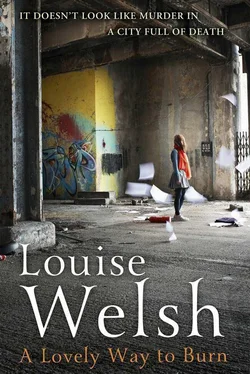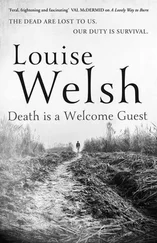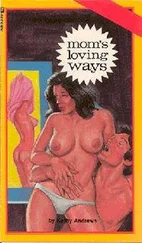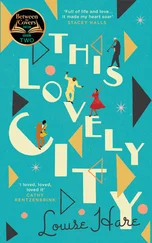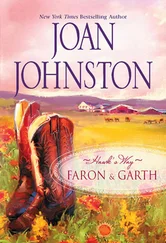Stevie took a deep breath. Then she tracked the beam slowly across the wall of the corridor and through the open door. Bodies stretched all the way from the entrance to the far wall, laid out head to toe; a mosaic of corpses.
An attempt had been made to preserve the bodies’ dignity. Those at the far end of the room had been covered by sheets, but at some point linen had grown scarce and the people closer to the doorway lay exposed, wearing the clothes they had died in. The humming sound made sense now. Bluebottles battled in a busy haze above the rows of dead.
Stevie saw an old man, his feet bare, his soles pink and vulnerable, his mouth agape. She saw a girl with tomato-red hair whose roots were showing. She saw a Rastaman with grey dreads and a black dready beard. She saw a girl with plaits that were secured by hair bobbles shaped like daisies. She saw an elderly woman whose wig had slid sideways, exposing the bald skull beneath. She saw a child of no more than three years old. She saw a fat man with cheeks like slabs of boiled ham. She saw a man with a hennaed beard, bushy and piratical. She saw a girl with a Vidal Sassoon bob and almond eyes. She saw a youth in a yellow Space Invaders T-shirt. She saw a large man with his hair pulled back in a ponytail. She saw a girl in a summer dress and green sandals. She saw an elderly man wearing an easyJet-orange-coloured turban. She saw a skinny white boy with tattooed sleeves. She saw a soldier whose arms were tucked tight by his sides, as if he had died on parade. She saw a middle-aged woman in a red-and-gold sari. She saw a bald man with a sunburnt head. She saw a nurse wearing stained scrubs.
She saw.
She saw.
She saw.
There was a whine louder than the droning flies, a sinking mechanical moan. Stevie knew what it was, but the sight of the bodies had driven everything else from her head and its name escaped her.
She had never grasped the miracle of distinctness so clearly before, had never truly understood death’s vastness. Each hanging limb and lolling head had belonged to a person. Each one of them had felt the approach of death and feared it. And now they were gone, leaving a husk of flesh behind. Nothing connected the dead except their deaths. They were lost to themselves, and to the living.
Stevie felt a horrible sudden urge to laugh. She clamped a hand over her mouth, shaking her head, as if denying what was in front of her could make it go away.
The machine hum was building. Its vibrations touched Stevie and she realised that it was the sound of a lift descending from the floors above. She clicked off her torch and ran for the stairs. The lift doors breathed open just as she reached the landing. A hospital trolley rattled in the corridor below as someone pushed it, slow and weary, towards the makeshift morgue.
Stevie’s sneakers scuffed against the stairs leading to Dr Ahumibe’s ward. The hospital’s fluorescent lights seared into her brain. She paused and pressed her knuckles to her eyes, wondering if this was the return of the sweats, the blessed bout that would carry her off.
A scrabbling sound that was all movement made her look up. A rat was scurrying down the stairs towards her, fat and sleek, busy as a working mum in her lunch hour. Stevie’s kick made contact. The rat gave a high scream as it skidded across the step, paws splayed seeking for purchase, then it tumbled, tail twisting, rump over belly, into the stairwell and landed somewhere below.
She tried to erase the memory of what she had seen in the basement, but reminders lined the walls of the hospital’s wards and corridors. People in white coats and green scrubs lay amongst the dead and the doctors and nurses still on their feet had a tranquillised look. None of the medics challenged her, but a man slumped on a chair reached out a hand and caught Stevie by the sleeve.
‘You don’t have it, do you?’
‘No,’ she said. ‘I did have, but I recovered.’
He gripped her wrist tight, his fingers digging into her flesh, bruising it. Stevie tried to pull away but the stranger held on tight, with a hand that felt all bone.
‘They should be experimenting on you.’ The man lifted his head and shouted, ‘This girl has the answer.’ It was as if one of the corpses from the basement had risen up and started to talk. He was sick, his face glossy with sweat, skin that might have once been a rich copper now sunk to khaki. She could see death on him, but the man raised his voice loud enough to turn some heads. ‘The antidote is in her blood.’
Stevie chopped at the sensitive part of his wrist with the edge of her hand and pulled free.
‘I’m sorry.’
‘You can save us,’ the man whispered.
‘No, you’re wrong.’
Stevie could see the stairs to Dr Ahumibe’s ward up ahead. She broke into a run.
‘Stop her,’ the man shouted. ‘She’s the antidote.’
But his voice was weaker than his grip, and if anyone heard him they paid no attention. After that, the quiet of the stairway came as a relief.
Stevie heard the sound of sobbing. A woman of about her own age sat hunched on a landing, her face buried in her hands. Stevie touched the woman’s hair as she passed, but she didn’t stop. There was nothing to say.
Dr John Ahumibe was in the small office where they had first talked. He was sitting at the desk, his head slumped across its surface. For a moment Stevie thought that he was dead, then she heard the sound of his breaths and saw the matching rise and fall of his ribs, and realised he was asleep. She took a chair from the other side of the desk, shut the door, set the chair against it, sat down and closed her eyes.
Stevie woke with a start, unsure of where she was. Dr Ahumibe’s head was still resting against the desk, but his eyes were open. He blinked and said, ‘You’re still alive.’
‘You were right. I’m a survivor.’
The doctor didn’t bother to lift his head.
‘I killed them all.’
‘Simon, Frei and Hope?’
The doctor rolled his head from side to side. His pupils were magnified, his eyes almost all black, and she wondered what he had taken.
‘The children. I killed them.’
There was no one there to hear her, but Stevie’s voice was a whisper. ‘Do you mean Joy Summers?’
‘No.’ The doctor rolled his head against the table again awkwardly, as if some mechanism had broken inside. ‘The children. It was my job to make sure that they were okay, and so I took care of them, one by one.’
Stevie got to her feet and looked through the small window in the door, out into the ward beyond. The lights were low, but she could see the closed doors of the side wards. She imagined the drawn sheets and the motionless swell beneath each one.
‘All of them?’
‘All that hadn’t been collected by their parents, or already died, yes.’
Stevie touched the glass. She felt an urge to open the doors and draw back the sheets, but stayed where she was.
‘Couldn’t you have taken them somewhere?’
‘Where?’
She turned to look at him.
‘I don’t know. The countryside?’
‘It would only have extended their deaths. It was better this way.’ The doctor sat up, dragging a hand across his face. His complexion had turned the grey of a riverbed after long months of drought. Stevie saw his features properly for the first time, and recognised the signs of the sweats on him. He asked, ‘Why are you here?’
‘I want to know what happened.’
‘No one knows.’ He yawned, and Stevie saw his teeth, the wet tongue and soft inside of his throat. ‘Sometimes viruses just appear.’ The doctor’s voice was cracked with grief and tiredness. There was a bottle of water on the table beside him. He poured a measure into a glass and took a small sip, as if he was unsure whether he would be able to hold it down. ‘I heard a theory, way back in the beginning when we had only just started to get seriously worried. An astrophysicist suggested that the virus might have been caused by space dust, brought in on a fallen asteroid. For some reason that still appeals to me. Outer space gave us life, now it brings us death.’
Читать дальше
